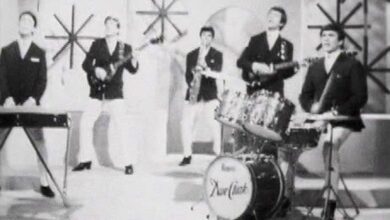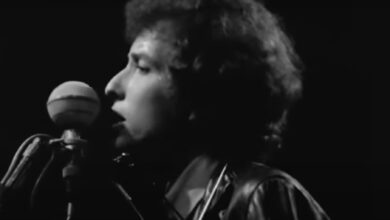Chad & Jeremy’s “A Summer Song” Captures the Fragile Beauty of Youth and Goodbye in 1964
Released in 1964 at the height of the British Invasion, Chad & Jeremy’s “A Summer Song” quietly etched its own path into the American musical consciousness—not with the bombast of rock ‘n’ roll or the swagger of Beatlemania, but with a soft melancholy that whispered directly to the heart. Where other British acts stormed the charts with guitars and backbeats, “A Summer Song” floated gently on a breeze of bittersweet nostalgia. It climbed to No. 7 on the Billboard Hot 100, but its real triumph was in how it created an enduring mood that generations would return to every time the weather turned warm and memories of first loves resurfaced.
Chad Stuart and Jeremy Clyde, the duo behind the song, brought a refined and delicate sensibility to the mid-60s pop landscape. Both hailing from England, their musical partnership began during their time at London’s Central School of Speech and Drama. Unlike many contemporaries, Chad & Jeremy leaned into folk-pop with an almost chamber music elegance, favoring nuanced melodies and poetic lyricism over the aggressive beat-driven sound of their peers. This gentleness—some might say British reserve—made them unlikely chart-toppers, but also helped them stand out.
The inspiration behind “A Summer Song” stemmed from a universal theme: the aching finality of summer romance. The lyrics, penned by Chad Stuart alongside Clive Metcalfe and Keith Noble, conveyed the inescapable sense of departure—of warm days slipping into memory and love being left behind with the season. It was written not with teenage angst, but with a maturity that framed the experience as part of life’s inevitable passing. It wasn’t just about young love—it was about time itself, and how we never quite hold on to the moments we cherish most.
Recorded in London with producer Shel Talmy—who also worked with The Kinks and The Who—the track leaned on sparse arrangements that let its fragility breathe. Acoustic guitars, soft string embellishments, and the duo’s breathy harmonies created a tender atmosphere that felt closer to a lullaby than a pop hit. Jeremy Clyde’s vocal lead had a plaintive quality that underscored the song’s reflective tone, while Chad’s harmonies added a comforting echo, like a memory answering back.
When released in the United States, “A Summer Song” found an audience far larger than expected. While it only managed to reach No. 49 in their native UK, it resonated deeply with American listeners. By October 1964, the song had reached the Top 10 in the U.S., and for many, it became a musical bookmark for an era of innocence, just as the country was about to undergo seismic cultural and political shifts. The timing of its success, shortly after the Beatles’ invasion, offered American audiences a different, softer side of British pop.
Beyond its chart performance, “A Summer Song” had a broader emotional impact. It stood in sharp contrast to the more aggressive and energetic British rock that was flooding the airwaves. Its wistfulness offered a kind of emotional refuge—a quiet moment of reflection in a rapidly accelerating world. It also helped reinforce the appeal of the folk-pop sound that would soon blossom further with artists like Simon & Garfunkel and The Mamas & The Papas.
The success of “A Summer Song” opened significant doors for Chad & Jeremy in the United States. They quickly found themselves embraced by American media, appearing on TV shows like The Dick Van Dyke Show and The Patty Duke Show, as well as becoming regulars on the variety circuit. The song’s popularity gave them a visibility that allowed them to transcend the “British Invasion” label and become beloved as personalities, not just pop stars.
In terms of influence, the song marked a quiet but crucial shift in popular music’s emotional range. It paved the way for more introspective, melancholic storytelling in pop—songs that didn’t need to shout to be heard. Later artists, from Bread to Belle and Sebastian, would echo the gentle vulnerability first captured so effectively in “A Summer Song.”
Over the years, the song has been covered by several artists, including Bobby Vee and Shelley Fabares, though none have captured the same aching delicacy as the original. Each interpretation has sought to tap into that nostalgic ache, but it is the breathy, feather-light original that continues to define the song’s essence.
The release of “A Summer Song” coincided with a time of massive social transformation. Just months after its success, the world would be reeling from the escalation in Vietnam, the Civil Rights Movement, and the deepening counterculture divide. The song, with its emphasis on the ephemeral, came to represent a fleeting calm before the storm—a soundtrack for a summer the world would never quite get back.
Decades later, “A Summer Song” retains its glow. It still appears on film soundtracks, in commercials, and on curated playlists every time the temperature rises and nostalgia kicks in. Whether used in movies like Rushmore or on classic oldies stations, it evokes the same sense of peaceful longing it always has.
In terms of musical legacy, the track helped cement the viability of understated folk-pop on mainstream radio. It showed that emotional depth and commercial success weren’t mutually exclusive. Its clean production, lyrical restraint, and subtle instrumentation would become a blueprint for dozens of future artists navigating the intersection of art and accessibility.
Though Chad Stuart passed away in 2020, the legacy of “A Summer Song” lives on. Its timeless message about fleeting love and fading seasons continues to strike a chord with listeners both young and old. For Jeremy Clyde, who still performs, the song remains a touchstone—an anthem of innocence and the fragility of youth.
Ultimately, what makes “A Summer Song” endure isn’t just its beauty, but its truth. It reminds us that the most cherished moments in life often pass without fanfare, slipping into memory before we realize their importance. In capturing that truth, Chad & Jeremy didn’t just write a hit—they wrote a hymn to impermanence. And that is why, every summer, it returns.



